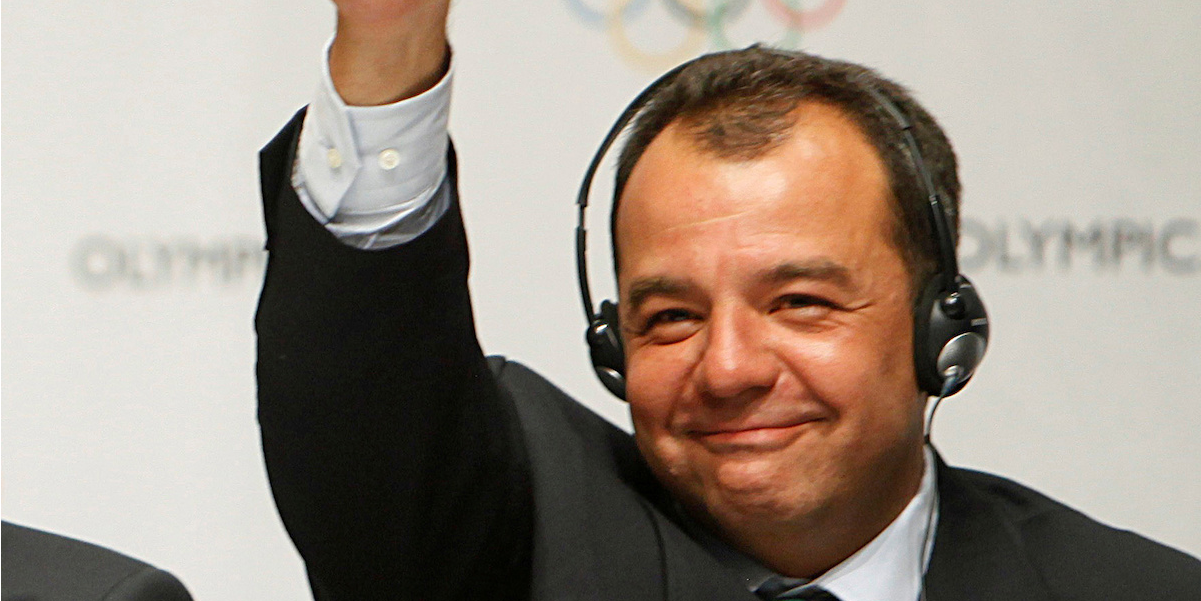- A former governor of Rio de Janeiro state told a judge Thursday that he paid two International Olympic Committee members $2 million to help secure votes for the Brazilian city to host the 2016 games, the Associated Press (AP) and Reuters reported.
- Sergio Cabral said he paid Lamine Diack and his son, Papa, $1.5 million and $500,000 respectively to secure up to nine votes for the Brazilian city in 2009.
- Cabral claimed that Carlos Arthur Nuzman, the Brazilian former chairman of the IOC, helped broker the discussions. Nuzman’s lawyer said Cabral has no evidence.
- Cabral was arrested in 2016 over charges including corruption and money laundering, and was sentenced to 200 years in jail. He is currently serving that sentence.
- Visit Business Insider’s homepage for more stories.
A former governor of Rio de Janeiro state, who is currently in jail, said he paid about $2 million in bribes to International Olympic Committee (IOC) members to secure the 2016 Summer Games for the Brazilian city, the Associated Press (AP) and Reuters reported.
Sergio Cabral, who governed Rio state between 2003 and 2010, told a federal judge on Thursday that he paid off two IOC members, through intermediaries, to secure a total of nine votes in a 2009 meeting that ultimately chose Rio to host the Olympic and Paralympic Games, the AP reported.
Cabral said he paid $1.5 million to Lamine Diack, the former president of the International Association of Athletics Federations (IAAF), to secure six votes in the meeting, the AP reported.
He later paid another $500,000 to Diack’s son, Papa, to secure three more votes for Rio from IOC members, the AP reported Cabral as saying.
Leonardo Gryner, who would later become the director-general of operations of Rio 2016, helped him get in touch with Papa Diack, he said.
Read more: What abandoned Olympic venues from around the world look like today

Carlos Arthur Nuzman, the Brazilian former chairman of the IOC, helped broker the discussions with the Diacks, the AP reported the former governor as saying.
According to the AP and Reuters, Cabral said Nuzman approached him in August 2009 and said: "Sergio, I want to tell you that the IAAF president, Lamine Diack, is a person that is open to undue advantages. He can secure five or six votes. In exchange, he wants $1.5 million."
Cabral said Nuzman approached him again a month later and said Papa Diack could secure nine votes for Rio in total, but would need another $500,000, according to the agencies.
"I told him it would be done," Cabral told the court, according to the AP and Reuters.
Cabral said he had bought votes for "the second stage of the vote," and that "no votes were bought after that," the AP reported.

The IOC held three rounds of voting for the 2016 Olympics. Chicago was knocked out in the first round; Tokyo in the second; and Madrid in the third and final.
The IOC announced that it had awarded the games to Rio de Janeiro on October 2 that year. The city reportedly paid a total of $13 billion to host the Olympics, using a mix of public and private money.
Read more: The Rio Olympics were a financial disaster and it keeps getting worse
The money used to buy the votes came from a debt owed to him by Arthur Soares, the AP reported Cabral as saying in court. It's not clear what the debt was.

Cabral was arrested in November 2016 over charges including corruption and money laundering, and was sentenced to 200 years in jail. He is currently serving that sentence.
Lamine Diack is currently facing trial in France for corruption and money laundering, and has been accused of receiving money to cover up positive doping tests by Russian athletes, the AP reported.
Papa Diack, is also facing trial for the same charges, The Guardian reported. Both father and son deny the charges.
Gryner was arrested for corruption, money laundering, and criminal organization over Rio's Olympics bid in 2017, but was released in October 2017.
Nuzman is currently suspended from the IOC. His lawyer, João Francisco Neto, said Cabral has no evidence and that his accusation will eventually "disappear," the AP reported.
"Cabral is sentenced to 200 years in prison. He needs to say things, but he has no evidence," Neto said, according to the AP.
"Even if that had happened, corporate corruption is not a crime in Brazil."

